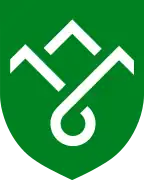Øyer
Øyer is a municipality in Innlandet county, Norway. It is located in the traditional district of Gudbrandsdal. The administrative centre of the municipality is the village of Tingberg. The two largest villages in the municipality are Granrudmoen and Tretten.
Øyer kommune
Øier herred (historic) | |
|---|---|
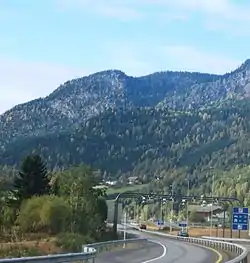 View of the Øyer area | |
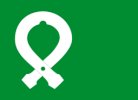 Flag 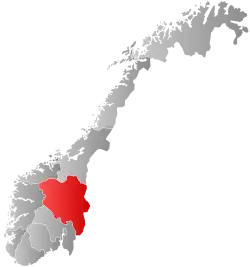 Innlandet within Norway | |
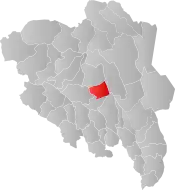 Øyer within Innlandet | |
| Coordinates: 61°15′55″N 10°24′48″E | |
| Country | Norway |
| County | Innlandet |
| District | Gudbrandsdal |
| Established | 1 Jan 1838 |
| • Created as | Formannskapsdistrikt |
| Administrative centre | Tingberg |
| Government | |
| • Mayor (2019) | Jon Halvor Midtmageli (Sp) |
| Area | |
| • Total | 640.15 km2 (247.16 sq mi) |
| • Land | 616.48 km2 (238.02 sq mi) |
| • Water | 23.67 km2 (9.14 sq mi) 3.7% |
| • Rank | #182 in Norway |
| Population (2022) | |
| • Total | 5,082 |
| • Rank | #181 in Norway |
| • Density | 8.2/km2 (21/sq mi) |
| • Change (10 years) | |
| Demonym | Øyværing[1] |
| Official language | |
| • Norwegian form | Neutral |
| Time zone | UTC+01:00 (CET) |
| • Summer (DST) | UTC+02:00 (CEST) |
| ISO 3166 code | NO-3440 |
| Website | Official website |
The 640-square-kilometre (250 sq mi) municipality is the 182nd largest by area out of the 356 municipalities in Norway. Øyer is the 181st most populous municipality in Norway with a population of 5,082. The municipality's population density is 8.2 inhabitants per square kilometre (21/sq mi) and its population has decreased by 0.3% over the previous 10-year period.[3][4]
General information
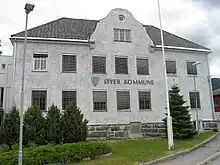
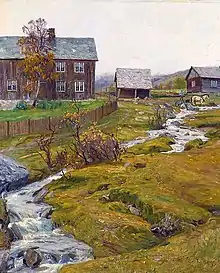
The parish of Øier (later spelled Øyer) was established as a municipality on 1 January 1838 (see formannskapsdistrikt law). On 1 January 1867, a small area of Øier (population: 40) was transferred to the neighboring municipality of Gausdal. The borders of Øyer have not changed since that time.[5]
Name
The municipality (originally the parish) is named after the old Øier farm (Old Norse: Øyja / accusative case and dative case) since the first Øyer Church had been located there for centuries. The name comes from the word øyi (nominative case). Two lakes in Norway had the name Øyi(r) in Old Norse times (now called Øymark and Øyeren), and these names are derived from the word eyrr which means "flat and fertile land along the edge of the water". This name is probably given to this area because the Gudbrandsdalslågen river widens out in the central part of the municipality and creates two river-lakes (called the Jemnefjorden and Gildbusfjorden). Øyi was probably the old name of one (or both) of these "fjords". Prior to 1918, the name was spelled "Øier".[6]
Coat of arms
.jpg.webp)
The coat of arms was granted on 29 April 1983. The official blazon is "Vert, a wooden staple argent" (Norwegian: I grønt ei sølv helder). This means the arms have a green field (background) and the charge is a wooden staple Norwegian: hegd or helder). The charge has a tincture of argent which means it is commonly colored white, but if it is made out of metal, then silver is used. This is a type of ring or staple that was historically made of wood and it was used to fasten a tree trunk to a rope in order to haul it over the land. Similar devices were used all over Norway, but this particular shape is typical for this area. The arms were designed by Ola T. Rybakken. The municipal flag has the same design as the coat of arms, but the staple design is off-center on the flag.[7][8][9][10]
Churches
The Church of Norway has two parishes (sokn) within the municipality of Øyer. It is part of the Sør-Gudbrandsdal prosti (deanery) in the Diocese of Hamar.
| Parish (sokn) | Church name | Location of the church | Year built |
|---|---|---|---|
| Tretten | Tretten Church | Tretten | 1728 |
| Øyer | Øyer Church | Tingberg | 1725 |
History
The Black Death reached Norway in the winter of 1349-1350. Øyer was one of the parishes that was most severely impacted. Estimates based on tax payments suggest that between 66-75% of all residents died. Many of the farms there became deserted farms (ødegårder), which remained vacant until the late 17th century. The Tretten Church parish (which had been a separate parish from Øyer) was merged with the Øyer Church parish after the Black Death, because the decimated population of Tretten no longer could maintain their own priest.
Economy
| Ancestry | Number |
|---|---|
| 71 | |
| 60 | |
| 55 | |
| 52 | |
| 32 |
Øyer has traditionally been a farming and logging municipality.
Recreation is increasingly important economically. Since it opened in 1989, Øyer's Hafjell Alpine Ski Center has grown to include 15 lifts (with an additional in construction) and 28 runs as wells as extensive cross-country skiing runs. It is located about 15 kilometres (9.3 mi) from the town of Lillehammer, making it very accessible to a larger population. Tobogganing, luge, and bobsled racing (on the 1994 Olympic course) are also found in the area.
Government
All municipalities in Norway are responsible for primary education (through 10th grade), outpatient health services, senior citizen services, welfare and other social services, zoning, economic development, and municipal roads and utilities. The municipality is governed by a municipal council of directly elected representatives. The mayor is indirectly elected by a vote of the municipal council.[12] The municipality falls under the Vestre Innlandet District Court and the Eidsivating Court of Appeal.
Municipal council
The municipal council (Kommunestyre) of Øyer is made up of 21 representatives that are elected to four year terms. The party breakdown of the council is as follows:
| Party Name (in Norwegian) | Number of representatives | |
|---|---|---|
| Labour Party (Arbeiderpartiet) | 7 | |
| Conservative Party (Høyre) | 2 | |
| Centre Party (Senterpartiet) | 10 | |
| Socialist Left Party (Sosialistisk Venstreparti) | 2 | |
| Total number of members: | 21 | |
| Party Name (in Norwegian) | Number of representatives | |
|---|---|---|
| Labour Party (Arbeiderpartiet) | 11 | |
| Conservative Party (Høyre) | 4 | |
| Christian Democratic Party (Kristelig Folkeparti) | 1 | |
| Centre Party (Senterpartiet) | 8 | |
| Socialist Left Party (Sosialistisk Venstreparti) | 1 | |
| Total number of members: | 25 | |
| Party Name (in Norwegian) | Number of representatives | |
|---|---|---|
| Labour Party (Arbeiderpartiet) | 8 | |
| Conservative Party (Høyre) | 9 | |
| Christian Democratic Party (Kristelig Folkeparti) | 1 | |
| Centre Party (Senterpartiet) | 5 | |
| Socialist Left Party (Sosialistisk Venstreparti) | 1 | |
| Liberal Party (Venstre) | 1 | |
| Total number of members: | 25 | |
| Party Name (in Norwegian) | Number of representatives | |
|---|---|---|
| Labour Party (Arbeiderpartiet) | 8 | |
| Conservative Party (Høyre) | 5 | |
| Christian Democratic Party (Kristelig Folkeparti) | 1 | |
| Centre Party (Senterpartiet) | 7 | |
| Socialist Left Party (Sosialistisk Venstreparti) | 3 | |
| Liberal Party (Venstre) | 1 | |
| Total number of members: | 25 | |
| Party Name (in Norwegian) | Number of representatives | |
|---|---|---|
| Labour Party (Arbeiderpartiet) | 10 | |
| Conservative Party (Høyre) | 3 | |
| Christian Democratic Party (Kristelig Folkeparti) | 1 | |
| Centre Party (Senterpartiet) | 5 | |
| Socialist Left Party (Sosialistisk Venstreparti) | 3 | |
| Øyer Local List (Øyer Bygdeliste) | 3 | |
| Total number of members: | 25 | |
| Party Name (in Norwegian) | Number of representatives | |
|---|---|---|
| Labour Party (Arbeiderpartiet) | 8 | |
| Conservative Party (Høyre) | 3 | |
| Christian Democratic Party (Kristelig Folkeparti) | 1 | |
| Centre Party (Senterpartiet) | 7 | |
| Socialist Left Party (Sosialistisk Venstreparti) | 1 | |
| Øyer Local List (Øyer Bygdeliste) | 5 | |
| Total number of members: | 25 | |
| Party Name (in Norwegian) | Number of representatives | |
|---|---|---|
| Labour Party (Arbeiderpartiet) | 9 | |
| Conservative Party (Høyre) | 1 | |
| Christian Democratic Party (Kristelig Folkeparti) | 1 | |
| Centre Party (Senterpartiet) | 10 | |
| Socialist Left Party (Sosialistisk Venstreparti) | 1 | |
| Øyer Local List (Øyer Bygdeliste) | 3 | |
| Total number of members: | 25 | |
| Party Name (in Norwegian) | Number of representatives | |
|---|---|---|
| Labour Party (Arbeiderpartiet) | 8 | |
| Conservative Party (Høyre) | 2 | |
| Christian Democratic Party (Kristelig Folkeparti) | 1 | |
| Centre Party (Senterpartiet) | 9 | |
| Socialist Left Party (Sosialistisk Venstreparti) | 2 | |
| Local list (Bygdalista) | 3 | |
| Total number of members: | 25 | |
| Party Name (in Norwegian) | Number of representatives | |
|---|---|---|
| Labour Party (Arbeiderpartiet) | 11 | |
| Conservative Party (Høyre) | 4 | |
| Christian Democratic Party (Kristelig Folkeparti) | 1 | |
| Centre Party (Senterpartiet) | 8 | |
| Liberal Party (Venstre) | 1 | |
| Total number of members: | 25 | |
| Party Name (in Norwegian) | Number of representatives | |
|---|---|---|
| Labour Party (Arbeiderpartiet) | 12 | |
| Conservative Party (Høyre) | 3 | |
| Christian Democratic Party (Kristelig Folkeparti) | 1 | |
| Centre Party (Senterpartiet) | 8 | |
| Liberal Party (Venstre) | 1 | |
| Total number of members: | 25 | |
| Party Name (in Norwegian) | Number of representatives | |
|---|---|---|
| Labour Party (Arbeiderpartiet) | 11 | |
| Conservative Party (Høyre) | 4 | |
| Christian Democratic Party (Kristelig Folkeparti) | 1 | |
| Centre Party (Senterpartiet) | 8 | |
| Liberal Party (Venstre) | 1 | |
| Total number of members: | 25 | |
| Party Name (in Norwegian) | Number of representatives | |
|---|---|---|
| Labour Party (Arbeiderpartiet) | 13 | |
| Christian Democratic Party (Kristelig Folkeparti) | 1 | |
| Centre Party (Senterpartiet) | 9 | |
| Joint list of the Conservative Party and Free Voters (Høyre og Frie Velgere) |
2 | |
| Total number of members: | 25 | |
| Party Name (in Norwegian) | Number of representatives | |
|---|---|---|
| Labour Party (Arbeiderpartiet) | 12 | |
| Conservative Party (Høyre) | 1 | |
| Christian Democratic Party (Kristelig Folkeparti) | 1 | |
| Centre Party (Senterpartiet) | 10 | |
| Liberal Party (Venstre) | 1 | |
| Total number of members: | 25 | |
| Party Name (in Norwegian) | Number of representatives | |
|---|---|---|
| Labour Party (Arbeiderpartiet) | 12 | |
| Conservative Party (Høyre) | 1 | |
| Christian Democratic Party (Kristelig Folkeparti) | 1 | |
| Centre Party (Senterpartiet) | 9 | |
| Liberal Party (Venstre) | 2 | |
| Total number of members: | 25 | |
| Party Name (in Norwegian) | Number of representatives | |
|---|---|---|
| Labour Party (Arbeiderpartiet) | 12 | |
| Conservative Party (Høyre) | 1 | |
| Christian Democratic Party (Kristelig Folkeparti) | 1 | |
| Centre Party (Senterpartiet) | 9 | |
| Liberal Party (Venstre) | 2 | |
| Total number of members: | 25 | |
| Party Name (in Norwegian) | Number of representatives | |
|---|---|---|
| Labour Party (Arbeiderpartiet) | 10 | |
| Conservative Party (Høyre) | 1 | |
| Christian Democratic Party (Kristelig Folkeparti) | 1 | |
| Centre Party (Senterpartiet) | 9 | |
| Liberal Party (Venstre) | 4 | |
| Total number of members: | 25 | |
| Party Name (in Norwegian) | Number of representatives | |
|---|---|---|
| Labour Party (Arbeiderpartiet) | 12 | |
| Conservative Party (Høyre) | 1 | |
| Christian Democratic Party (Kristelig Folkeparti) | 1 | |
| Farmers' Party (Bondepartiet) | 8 | |
| Liberal Party (Venstre) | 3 | |
| Total number of members: | 25 | |
| Party Name (in Norwegian) | Number of representatives | |
|---|---|---|
| Labour Party (Arbeiderpartiet) | 11 | |
| Christian Democratic Party (Kristelig Folkeparti) | 1 | |
| Joint List(s) of Non-Socialist Parties (Borgerlige Felleslister) | 12 | |
| Total number of members: | 24 | |
| Party Name (in Norwegian) | Number of representatives | |
|---|---|---|
| Labour Party (Arbeiderpartiet) | 11 | |
| Farmers' Party (Bondepartiet) | 10 | |
| Joint list of the Liberal Party (Venstre) and the Radical People's Party (Radikale Folkepartiet) | 3 | |
| Total number of members: | 24 | |
| Party Name (in Norwegian) | Number of representatives | |
|---|---|---|
| Labour Party (Arbeiderpartiet) | 10 | |
| Farmers' Party (Bondepartiet) | 9 | |
| Joint list of the Liberal Party (Venstre) and the Radical People's Party (Radikale Folkepartiet) | 5 | |
| Total number of members: | 24 | |
| Party Name (in Norwegian) | Number of representatives | |
|---|---|---|
| Labour Party (Arbeiderpartiet) | 9 | |
| Radical People's Party (Radikale Folkepartiet) | 4 | |
| Farmers' Party (Bondepartiet) | 11 | |
| Total number of members: | 24 | |
| Note: Due to the German occupation of Norway during World War II, no elections were held for new municipal councils until after the war ended in 1945. | ||
Mayors
The mayors of Øyer (incomplete list):
- 1838-1854: Amund Tande
- 1884-1886: Ole Moe[33]
- 1897-1901: Ole Torgersen Gillebo (V)[34]
- 1902-1910: Christian Mageli[35]
- 1911-1916: Ole Torgersen Gillebo (V)[34]
- 1917-1919: Kristian Bjørnstad[36]
- 1920-1922: M. Lunke (Bp)[37]
- 1923-1925: Ole Torgersen Gillebo (V)[34]
- 1926-1931: O. Hageløkken (AD)[38]
- 1932-1934: John Vedum (Bp)[39]
- 1935-1941: Tor Mageli (Bp)
- 1945-1946: Tor Mageli (Bp)
- 1946-1947: Ole Hageløkken (V)
- 1948-1955: Erl. Skjønsberg (Bp)
- 1956-1959: Einar Bræin (V)
- 1960-1975: Lars Bjerke (Sp)
- 1976-1979: Geir Korslund (Ap)
- 1980-1983: Einar Moe (Sp)
- 1984-1987: Arne Bueie (Ap)
- 1988–1995: Ola Prestegarden (Sp)
- 1996-1999: Rigmor Aarø Spiten (Sp)
- 1999-2007: Ole Hageløkken (Ap)
- 2007-2015: Mari Botterud (H)
- 2015–2019: Brit Kramprud Lundgård (Ap)
- 2019–present: Jon Halvor Midtmageli (Sp)
Geography
Øyer municipality is bordered by Ringebu Municipality to the north, Stor-Elvdal Municipality to the east, Ringsaker Municipality to the southeast, Lillehammer Municipality to the south, and Gausdal Municipality to the west. The municipality is divided into two parishes: Øyer in the south and Tretten in the north.
The municipality is located in the Gudbrandsdal valley, through which the Gudbrandsdalslågen river flows. The lake Losna is partially located in the municipality.
Notable people
- Anders Lysgaard (1756 in Tretten – 1827), a farmer and sheriff, rep. at the Norwegian Constituent Assembly
- Johannes Skar (1837 in Øyer - 1914), a Norwegian educator and folklorist
- Matias Skard (1846 at Øyer - 1927), a philologist, educator, psalmist and essayist
- Anton Kraabel (1862 in Øyer – 1934), the 11th Lieutenant Governor of North Dakota
- Simon Johnson (1874 in Øyer – 1970), a Norwegian-American newspaper editor and author
- Ottar Grepstad (born 1953 in Øyer), a Norwegian Nynorsk writer
- Kjetil-Vidar Haraldstad (born 1973 in Øyer), a drummer in black metal bands Satyricon & 1349
Sport
- Ole Stenen (1903 in Øyer – 1975), a Nordic skier, silver medallist at the 1932 Winter Olympics
- Erling Jevne (born 1966), a skier, team gold and silver medallist at the 1998 Winter Olympics
- Roger Hjelmstadstuen (born 1979 in Øyer), a retired snowboarder, competed at the 1998 Winter Olympics
- Aleksander Melås (born 1998 in Øyer), a retired Norwegian luger.
Twin towns – sister cities
Øyer has sister city agreements with the following places:[40]
 Färgelanda, Sweden
Färgelanda, Sweden Muhos, Finland
Muhos, Finland
References
- "Navn på steder og personer: Innbyggjarnamn" (in Norwegian). Språkrådet.
- "Forskrift om målvedtak i kommunar og fylkeskommunar" (in Norwegian). Lovdata.no.
- Statistisk sentralbyrå (2022). "Table: 06913: Population 1 January and population changes during the calendar year (M)" (in Norwegian).
- Statistisk sentralbyrå (2022). "09280: Area of land and fresh water (km²) (M)" (in Norwegian).
- Jukvam, Dag (1999). "Historisk oversikt over endringer i kommune- og fylkesinndelingen" (PDF) (in Norwegian). Statistisk sentralbyrå. ISBN 9788253746845.
- Rygh, Oluf (1900). Norske gaardnavne: Kristians amt (in Norwegian) (4 ed.). Kristiania, Norge: W. C. Fabritius & sønners bogtrikkeri. p. 160.
- "Civic heraldry of Norway - Norske Kommunevåpen". Heraldry of the World. Retrieved 17 April 2023.
- "Oyer, Oppland (Norway)". Flags of the World. Retrieved 17 April 2023.
- "Godkjenning av våpen og flagg". Lovdata.no (in Norwegian). Norges kommunal- og arbeidsdepartementet. 7 July 1983. Retrieved 17 April 2023.
- "Om Øyer" (in Norwegian). Øyer kommune. Retrieved 3 January 2009.
- "Immigrants and Norwegian-born to immigrant parents, by immigration category, country background and percentages of the population". ssb.no. Archived from the original on 2 July 2015. Retrieved 14 June 2017.
- Hansen, Tore; Vabo, Signy Irene, eds. (20 September 2022). "kommunestyre". Store norske leksikon (in Norwegian). Kunnskapsforlaget. Retrieved 14 October 2022.
- "Tall for Norge: Kommunestyrevalg 2019 - Innlandet". Valg Direktoratet. Retrieved 25 June 2022.
- "Tall for Norge: Kommunestyrevalg 2015 - Oppland". Valg Direktoratet.
- "Table: 04813: Members of the local councils, by party/electoral list at the Municipal Council election (M)" (in Norwegian). Statistics Norway.
- "Tall for Norge: Kommunestyrevalg 2011 - Oppland". Valg Direktoratet.
- Kommunestyrevalget 1999 (PDF) (in Norwegian). Oslo-Kongsvinger, Norge: Statistisk sentralbyrå. 2000. ISBN 8253748531. ISSN 0332-8023.
- Kommunestyrevalget 1995 (PDF) (in Norwegian). Oslo-Kongsvinger, Norge: Statistisk sentralbyrå. 1996. ISBN 8253743351. ISSN 0332-8023.
- Kommunestyrevalget 1991 (PDF) (in Norwegian). Oslo-Kongsvinger, Norge: Statistisk sentralbyrå. 1993. ISBN 8253737939. ISSN 0332-8023.
- Kommunestyrevalget 1987 (PDF) (in Norwegian). Oslo-Kongsvinger, Norge: Statistisk sentralbyrå. 1988. ISBN 8253726325. ISSN 0332-8023.
- Kommunestyrevalget 1983 (PDF) (in Norwegian). Oslo-Kongsvinger, Norge: Statistisk sentralbyrå. 1984. ISBN 8253720378. ISSN 0332-8023.
- Kommunestyrevalget 1979 (PDF) (in Norwegian). Oslo, Norge: Statistisk sentralbyrå. 1979. ISBN 8253710836. ISSN 0332-8023.
- Kommunevalgene 1975 (PDF) (in Norwegian). Oslo, Norge: Statistisk sentralbyrå. 1977. ISBN 8253705646.
- Kommunevalgene 1972 (PDF) (in Norwegian). Vol. I. Oslo, Norge: Statistisk sentralbyrå. 1973. ISBN 8253701144.
- "Kommunevalgene 1967" (PDF) (in Norwegian). Oslo, Norge: Statistisk sentralbyrå. 1967.
- "Kommunevalgene 1963" (PDF) (in Norwegian). Oslo, Norge: Statistisk sentralbyrå. 1964.
- "Kommunevalgene og Ordførervalgene 1959" (PDF) (in Norwegian). Oslo, Norge: Statistisk sentralbyrå. 1960.
- "Kommunevalgene og Ordførervalgene 1955" (PDF) (in Norwegian). Oslo, Norge: Statistisk sentralbyrå. 1957.
- "Kommunevalgene og Ordførervalgene 1951" (PDF) (in Norwegian). Oslo: Statistisk sentralbyrå. 1952.
- "Kommunevalgene og Ordførervalgene 1947" (PDF) (in Norwegian). Oslo: Statistisk sentralbyrå. 1948.
- "Kommunevalgene og Ordførervalgene 1945" (PDF) (in Norwegian). Oslo: Statistisk sentralbyrå. 1947.
- "Kommunevalgene og Ordførervalgene 1937" (PDF) (in Norwegian). Oslo: Statistisk sentralbyrå. 1938.
- "Ordførervalg". Hamar Stiftstidende. 8 January 1884. p. 3. Retrieved 22 April 2023.
- Holmen, Lars; Stensrud, Oddvar; Korslund, Geir, eds. (2003). "I gamle fotefar" (PDF) (in Norwegian). Øyer og Tretten Historielag. Retrieved 22 April 2023.
- "Ordførervalg". Gudbrandsdalens Blad. 10 January 1902. p. 2. Retrieved 22 April 2023.
- "Ordførervalg". Samhold. 5 January 1917. p. 2. Retrieved 22 April 2023.
- "Fylkesting". Hadeland. 18 March 1920. p. 2. Retrieved 22 April 2023.
- "I Øyer tok demokratene både ordfører og viseordførerplassen". Laagen. 12 December 1925. p. 2. Retrieved 22 April 2023.
- "Bondepartiet fikk ordføreren i Øyer". Laagen. 17 December 1931. p. 2. Retrieved 22 April 2023.
- "Vennskapskommuner" (in Norwegian). Øyer kommune. Retrieved 3 January 2009.
External links
- Municipal fact sheet from Statistics Norway (in Norwegian)*
 Oppland travel guide from Wikivoyage
Oppland travel guide from Wikivoyage  Gudbrandsdalen travel guide from Wikivoyage
Gudbrandsdalen travel guide from Wikivoyage- Church Records for those with ancestors from Øyer. Baptisms and deaths between 1671 and 1857. (in Norwegian)



